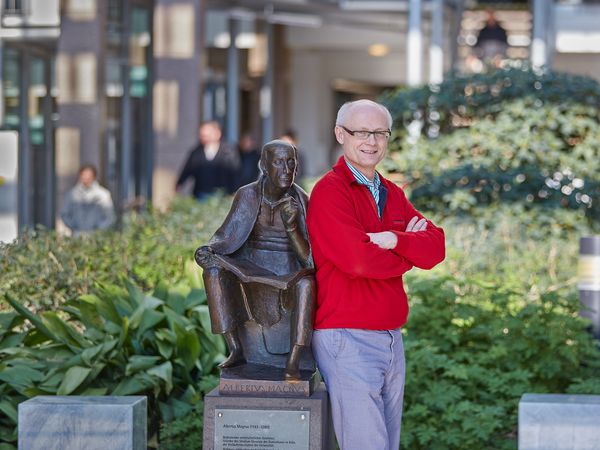In 2016, the World Congress of Pathologists will take place in Cologne. Professor Reinhard Büttner, Director of the Institute of Pathology at Cologne University Hospital, talks to us about this major event, tells us why he feels at home in Cologne and explains why the ‘Tatort’ pathologist is not actually a pathologist at all.
CCB: Many people only know pathologists from the TV show ‘Tatort’. What does a pathologist actually do? And what do you think is the biggest nonsense that is said about pathologists?
Prof. Dr. Reinhard Büttner: It's simply a confusion of words. This comes from the fact that in American English, the generic term PATHOLOGY is used to describe various medical disciplines. What the ‘Tatort pathologist’ does is a separate discipline in German and is called forensic medicine. In German-speaking countries, pathology is about medical diagnostics. The pathologist makes tissue sections, examines them under the microscope and diagnoses them. We examine dead people in relatively rare cases.
In 2011, you took over as head of the Institute of Pathology at the University Hospital of Cologne. What is your area of specialisation there?
My speciality is molecular pathology, where we diagnose genetic changes in the tissues that are very important for the treatment of the patient. We now believe that cancer is essentially caused by genetic damage. My area of focus is to deduce the tumour from the type of genetic change and thus predict the best possible therapy. We have drugs that can block certain genetic changes. We speak of predictive pathology. In Cologne, we had colleagues who shared this interest. In retrospect, it was a complete success! I am very grateful.
You studied and conducted research in Mainz and Munich. You have been to Texas, London, Regensburg and later as a professor at the RWTH in Aachen. Before you moved to the University Hospital of Cologne, you headed the Institute of Pathology in Bonn. What makes Cologne special?
The people of Cologne define Cologne. There are many young people here, the university is very active, and you can find people from all over the world living in Cologne. There is something very open about Cologne. You can also tell from the fact that many artists live in Cologne. It's just so nice to be at the harbour or on the cathedral square on a summer evening... There are other beautiful cities, but I felt much less comfortable there.
The Cologne Convention Bureau has travelled halfway around the world with you. In 2012 you were together in Cape Town. In March you went to Seattle...
The reason for this is that we are hosting the World Congress of Pathologists in Cologne this summer. This is a major scientific event for the city of Cologne and something of an Olympics for us pathologists. We have been bidding for many years...
And then Cologne got the nod – why?
The main argument is that the organisers are confident that they can attract as many people as possible. Then, of course, there are the soft factors: they choose beautiful locations where you can imagine following up the event with a holiday. Central Europe is attractive, and so is Cologne, of course.
What does a congress like this actually mean for Cologne?
Overall, I see the congress as an expression of Cologne's importance as a centre of science. The city is experiencing an incredible boost as a result. Cologne is also seen internationally in the field of medicine: at our partner university in Pittsburgh, when a certain clinical picture is treated, they speak of the ‘Cologne Protocol’. The fact that so many scientists in the field of medical diagnostics are coming to Cologne is an indication that Cologne has become very attractive and visible as an international centre of medicine.
Where do you take your colleagues in Cologne?
We have a supporting programme, of course: many of the scientists don't come alone, they bring their families with them. We have an attractive programme for them: museum visits, an organ concert in the cathedral exclusively for the pathologists, excursions and much more.
